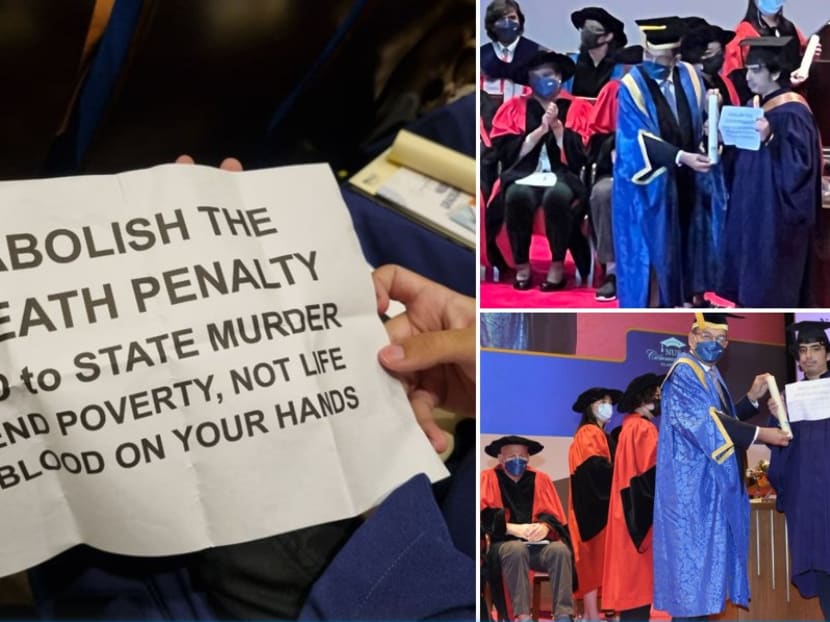Police ‘looking into’ report of NUS student who flashed anti-death penalty notice at graduation ceremony

- The police have received a report about a National University of Singapore student after he held up an anti-death penalty notice during his graduation ceremony
- Mr Luke Levy's Twitter post recounting what he did at the ceremony has been retweeted more than 900 times
- Lawyers told TODAY that he may have violated the Public Order Act, which regulates assemblies and processions in public areas
- They said it is debatable if the university constitutes a public space
- When contacted, Mr Levy did not have any comments except to repeat his point that the death penalty should be abolished
SINGAPORE — The police here have received a report about a National University of Singapore (NUS) student after he held up a paper with an anti-death penalty message during his graduation ceremony.
“The police confirm that a report was lodged and are looking into the matter,” they said in response to queries from TODAY.
They did not say who made the report or when it was made.
The student’s posts on Twitter about what he did have been retweeted more than 900 times and have received 2,270 likes since it was published on July 11.
Mr Luke Levy, 25, who majored in geography, said in a series of tweets that he unfolded a "sign" from the pocket of his graduation gown, walked on stage, posed for a photo of himself receiving a scroll of his degree on stage, and left the stage with the "sign" in hand.
On Twitter, he posted a picture of the "sign", which was a piece of paper with words in black printed that read: “Abolish the death penalty. No to state murder. End poverty, not life. Blood on your hands.”
Mr Levy noted in his post that the time of the graduation ceremony was “around the time of Kalwant Singh’s last appeal for his life in court before execution”.
Malaysian Kalwant Singh was convicted and given the death penalty here in June 2016 for trafficking heroin. He failed in a last-ditch attempt on July 6 for a stay on his execution in Singapore. The 31-year-old was hanged on July 7.
Mr Levy claimed that his walk across the stage with the printed notice was removed from the video of the ceremony that was on NUS' YouTube account. He also claimed that the notice he held up was censored in the official photo he bought of the graduation event.
In response to queries from TODAY, NUS said that its graduation ceremony is to celebrate the achievements of students in completing their studies at the university.
"All graduates and guests are expected to conduct themselves appropriately during the occasion. It is not a forum for advocacy," it added.
Mr Levy is the co-founder of Students for a Safer NUS, a ground-up initiative among undergraduates that sought to keep the student community educated on how to deal with sexual assault, so that affected students need not rely solely on institutional support.
Lawyers who spoke to TODAY said that the graduate may have violated the Public Order Act, which regulates assemblies and processions in public places. However, the lawyers said that it was debatable if NUS would be considered a public space.
Ms Jessica Cheung, senior associate of law firm Edmond Pereira Law Corporation, said that based on Mr Levy’s act of him holding up the paper with the written message, should it be verified to be him, he could be charged under Section 16 of the Public Order Act.
Under Section 16, anyone who knowingly holds a public assembly or public procession without a permit can be liable for a fine of up to S$5,000.
The laws here define public assembly as a gathering or meeting where the purpose is to demonstrate support for or oppose the views or actions of any group of persons or government, publicise a cause or campaign or commemorate an event.
Unlike public processions, public assemblies include demonstrations by a single person.
Ms Cheung said: “Under the Public Order Act, a public place includes any place to which members of the public have access as of right or by virtue of express or implied permissions and, more crucially, whether or not access to the place may be restricted at particular times or for particular purposes.
“Accordingly, it may be wholly possible that the graduation event could fall within the remit of the definition.”
However, both Ms Cheung and Ms Nithya Devi, a lawyer from law firm Kalidass Law Corporation, said that it is arguable if NUS is considered a public space or not.
”Ultimately, it really depends on investigations into the whole matter, and not just based on his tweets,” Ms Devi said, adding that the purpose of his actions is key in determining if his actions fall under the Public Order Act.
When contacted, Mr Levy told TODAY that he had nothing more to say on the matter for now, except that he wanted to repeat his point that the death penalty should be abolished here.








